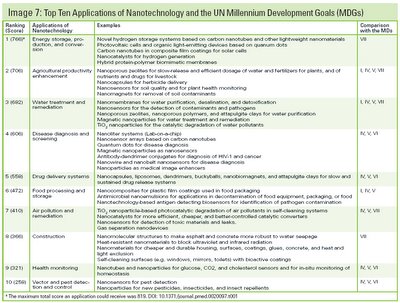Nanotechnologies, ethics and the millennium development goals
The United Nations Educational, Scientific and Cultural Organization or UNESCO in their recent 2006 publication titled "The Ethics & Politics of Nanotechnology" present examples of applications:
 UNESCO go further and says "....as public awareness of the dangers and possibilities continues to increase, the involvement of all manner of participants will move further ‘upstream’ – into the heart of scientific work itself".
UNESCO go further and says "....as public awareness of the dangers and possibilities continues to increase, the involvement of all manner of participants will move further ‘upstream’ – into the heart of scientific work itself".
A study undertaken by the Canadian Program on Genomics and Global Health (CPGGH), at the University of Toronto Joint Centre for Bioethics (JCB) during 2005, suggests that nanotechnology applications could help "people in developing countries tackle their most urgent problems - extreme poverty and hunger, child mortality, environmental degradation and diseases such as malaria and HIV/AIDS"
Whilst technology alone cannot solve extreme poverty, it can nevertheless play a vital role. As with all applied research, specific and clearly idenitfed needs will have to be targeted and solutions developed that tackle the real problems and needs.
Imagine for example, one day in the future in a remote village in Africa, a health worker places a drop of a patient's blood on a piece of engineered plastic about the size of a coin: lab-on-a-chip. Within minutes, a full diagnosis is complete including analysis for infectious diseases such as malaria and HIV/AIDS, hormonal imbalances and even specific cancers. Such as a possibility shows that today's emerging point-of-care medical diagnostic technologies are relevant to the needs of the poorest and not just rich nations.
Issues relating to IPR and funding will need to be resolved upfront by the international community - that is by influencial governments, business leaders, scientists and NGOs to help avoid the previous pitfalls and ethical issues that impeded such progress - as we all saw and still see with AIDS treatment for Africa, IPR issues and lack of sufficient funding/resources has caused painful and fatal delays.
Shak Gohir
Business & Programme Manager
Labels: Nanotechnology, Poverty


0 Comments:
Post a Comment
<< Home